IDAS Series: Civilian Resilience in Times of Crisis: European and Taiwanese Perspectives
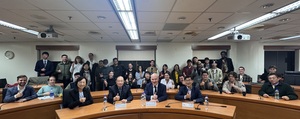
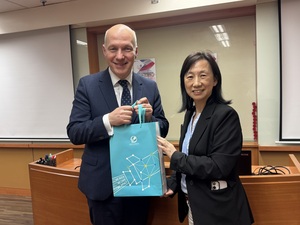
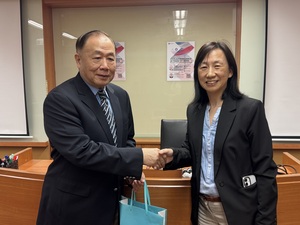
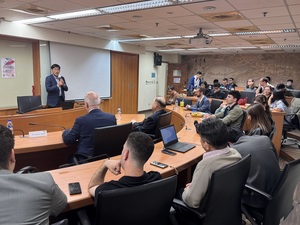
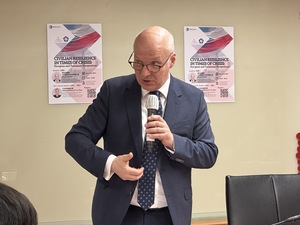
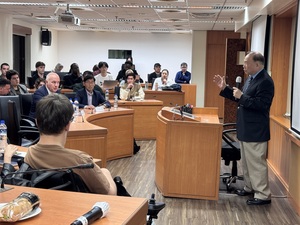
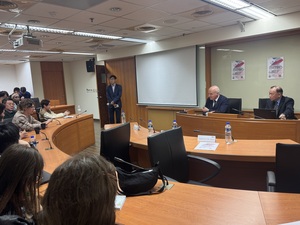
Date :
2025-03-28
Department :
International Doctoral Program in Asia-Pacific Studies
【Article by IDAS】
As geopolitical tensions escalate and conflicts become more complex, the role of civilian resilience has never been more critical. National Chengchi University’s (NCCU) International Doctoral Program on Asia-Pacific Studies (IDAS) hosted a timely lecture “Civilian Resilience in Times of Crisis: European and Taiwanese Perspectives,” which was presented by Senator Pavel Fischer, Chairman of the Czech Senate’s Foreign Affairs, Defense and Security Committee, and Legislator Yeong-Kang Chen, the former Deputy Defense Minister. The event was held on March 14, 2025, with assistance from the Czech-Taiwanese Business Chamber.
Senator Fischer explained that the Czech Republic’s understanding and practice of “resilience” had been shaped by the past 30 years of recurring floods and extreme weather events. These experiences have led to the development of a robust crisis response system in which connectivity between ministries is key and societal resilience plays a central role. He also recalled instances in which Taiwan provided timely humanitarian aid to the Czech Republic during disasters, reflecting a valuable spirit of international friendship and cooperation. However, he acknowledged that the Czech Republic’s current crisis management system does not yet systematically incorporate responses to external threats. He emphasized that the Ukraine’s demonstrated ability to integrate national defense with local crisis management, along with its use of early-warning technologies, provides a model that the Czech Republic should strive to emulate.
Senator Fischer further pointed out that Russia’s hybrid warfare strategy has expanded beyond military action to include information and psychological dimensions that aim to erode public trust in democratic governments and weaken civic cohesion. In actual fact, some religious organizations in the Czech Republic remain under Russian influence, and misinformation on social media also threatens societal stability. These challenges underscore the difficulties that democratic societies face in relation to institutional integration and cross-sectoral collaboration. Moreover, Senator Fischer emphasized that, in times of crisis, it is the leaders’ responsibility to honestly inform the public about the crisis, thereby enabling citizens to correctly understand the situation and related government messages, and avoid being manipulated by hostile forces that would seek to disrupt. Only by integrating military and civil defense systems and establishing effective early-warning and response mechanisms can societies enhance their overall resilience to threats.
As for Taiwan, Legislator Chen also drew from the lessons of the war in Ukraine and emphasized that Taiwan must simultaneously strengthen both its military defense and societal resilience when facing sudden crises. He pointed out that modern warfare extends beyond traditional military conflict to include domains such as energy, communications, logistics, and social systems. At present, Taiwan lacks a comprehensive framework for national security and societal stability, and its inter-agency coordination is inadequate. Government policies tend to focus on economic development and climate change, without fully integrating national security considerations. While the government has proposed raising the defense budget to 3% of GDP, he also argued that long-term investments in social infrastructure and disaster preparedness—particularly in terms of regional coordination and infrastructure reinforcement—are even more critical.
Legislator Chen further noted that Taiwan is heavily dependent on imported energy, and its power grid is both dense and fragile. An attack could paralyze communications, financial systems, and essential services. Taiwan currently has only 14 undersea cables, revealing a severe lack of backup capacity for telecommunications. In addition, the Chinese government exerts long-term pressure on Taiwan through military exercises and information warfare. Taiwan’s air force maintenance is also highly dependent on foreign supply chains. Coupled with rising geopolitical risks, this highlights the vulnerability of both Taiwan’s economy and security. Therefore, Legislator Chen called for a comprehensive strategic framework that integrates military, energy, communication, and societal security, while encouraging youth engagement in national defense and civil service to enhance national resilience and crisis response capacity. He acknowledged that societal resilience needs more money and takes longer to create. With that being said, he emphasized that although the Ukraine’s success cannot be duplicated in Taiwan, lessons must be learned from the high price that the Ukrainians have paid.
The floor was then open to all participants, including students, faculty and members of the community, to pose their own questions. The first question concerned how the state can handle or communicate with uncivil aspects of society. Senator Fischer answered the question by focusing on the concept of good citizenship. Citizenship is a set of skills, behaviors, and values that can be called upon in times of crisis. He referred to civilian resilience as a bottom-up process. For Legislator Chen, the answer depended on the active protection of the Constitution and democracy, where local media have a role to clarify and defend the truth. The questions and conversations that followed generally focused on the challenges of building civilian resilience in a shifting international order, and covered topics such as European collective defense, US-China rivalry, domestic budget cuts, and changing US priorities. Both Senator Fischer and Legislator Chen addressed these questions and looked for practical solutions that focused on building civilian capacity for adaptation.
In conclusion, the lecture explored the need for societies to meet their strategic challenges in an increasingly uncertain international system. Through the fostering of civilian resilience, states such as the Czech Republic and Taiwan could strengthen government institutions to combat disinformation and diplomatic coercion. Students gained a deeper understanding of the realities and necessities for the development of civilian-led resilience efforts supported by the government. These discussions have not only underscored the importance of a “whole-of-nation” approach but have also opened doors for further questions and exploration.
As geopolitical tensions escalate and conflicts become more complex, the role of civilian resilience has never been more critical. National Chengchi University’s (NCCU) International Doctoral Program on Asia-Pacific Studies (IDAS) hosted a timely lecture “Civilian Resilience in Times of Crisis: European and Taiwanese Perspectives,” which was presented by Senator Pavel Fischer, Chairman of the Czech Senate’s Foreign Affairs, Defense and Security Committee, and Legislator Yeong-Kang Chen, the former Deputy Defense Minister. The event was held on March 14, 2025, with assistance from the Czech-Taiwanese Business Chamber.
Senator Fischer explained that the Czech Republic’s understanding and practice of “resilience” had been shaped by the past 30 years of recurring floods and extreme weather events. These experiences have led to the development of a robust crisis response system in which connectivity between ministries is key and societal resilience plays a central role. He also recalled instances in which Taiwan provided timely humanitarian aid to the Czech Republic during disasters, reflecting a valuable spirit of international friendship and cooperation. However, he acknowledged that the Czech Republic’s current crisis management system does not yet systematically incorporate responses to external threats. He emphasized that the Ukraine’s demonstrated ability to integrate national defense with local crisis management, along with its use of early-warning technologies, provides a model that the Czech Republic should strive to emulate.
Senator Fischer further pointed out that Russia’s hybrid warfare strategy has expanded beyond military action to include information and psychological dimensions that aim to erode public trust in democratic governments and weaken civic cohesion. In actual fact, some religious organizations in the Czech Republic remain under Russian influence, and misinformation on social media also threatens societal stability. These challenges underscore the difficulties that democratic societies face in relation to institutional integration and cross-sectoral collaboration. Moreover, Senator Fischer emphasized that, in times of crisis, it is the leaders’ responsibility to honestly inform the public about the crisis, thereby enabling citizens to correctly understand the situation and related government messages, and avoid being manipulated by hostile forces that would seek to disrupt. Only by integrating military and civil defense systems and establishing effective early-warning and response mechanisms can societies enhance their overall resilience to threats.
As for Taiwan, Legislator Chen also drew from the lessons of the war in Ukraine and emphasized that Taiwan must simultaneously strengthen both its military defense and societal resilience when facing sudden crises. He pointed out that modern warfare extends beyond traditional military conflict to include domains such as energy, communications, logistics, and social systems. At present, Taiwan lacks a comprehensive framework for national security and societal stability, and its inter-agency coordination is inadequate. Government policies tend to focus on economic development and climate change, without fully integrating national security considerations. While the government has proposed raising the defense budget to 3% of GDP, he also argued that long-term investments in social infrastructure and disaster preparedness—particularly in terms of regional coordination and infrastructure reinforcement—are even more critical.
Legislator Chen further noted that Taiwan is heavily dependent on imported energy, and its power grid is both dense and fragile. An attack could paralyze communications, financial systems, and essential services. Taiwan currently has only 14 undersea cables, revealing a severe lack of backup capacity for telecommunications. In addition, the Chinese government exerts long-term pressure on Taiwan through military exercises and information warfare. Taiwan’s air force maintenance is also highly dependent on foreign supply chains. Coupled with rising geopolitical risks, this highlights the vulnerability of both Taiwan’s economy and security. Therefore, Legislator Chen called for a comprehensive strategic framework that integrates military, energy, communication, and societal security, while encouraging youth engagement in national defense and civil service to enhance national resilience and crisis response capacity. He acknowledged that societal resilience needs more money and takes longer to create. With that being said, he emphasized that although the Ukraine’s success cannot be duplicated in Taiwan, lessons must be learned from the high price that the Ukrainians have paid.
The floor was then open to all participants, including students, faculty and members of the community, to pose their own questions. The first question concerned how the state can handle or communicate with uncivil aspects of society. Senator Fischer answered the question by focusing on the concept of good citizenship. Citizenship is a set of skills, behaviors, and values that can be called upon in times of crisis. He referred to civilian resilience as a bottom-up process. For Legislator Chen, the answer depended on the active protection of the Constitution and democracy, where local media have a role to clarify and defend the truth. The questions and conversations that followed generally focused on the challenges of building civilian resilience in a shifting international order, and covered topics such as European collective defense, US-China rivalry, domestic budget cuts, and changing US priorities. Both Senator Fischer and Legislator Chen addressed these questions and looked for practical solutions that focused on building civilian capacity for adaptation.
In conclusion, the lecture explored the need for societies to meet their strategic challenges in an increasingly uncertain international system. Through the fostering of civilian resilience, states such as the Czech Republic and Taiwan could strengthen government institutions to combat disinformation and diplomatic coercion. Students gained a deeper understanding of the realities and necessities for the development of civilian-led resilience efforts supported by the government. These discussions have not only underscored the importance of a “whole-of-nation” approach but have also opened doors for further questions and exploration.


 Fax:886-2-29379611
Fax:886-2-29379611